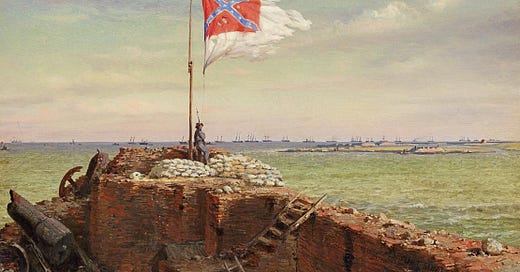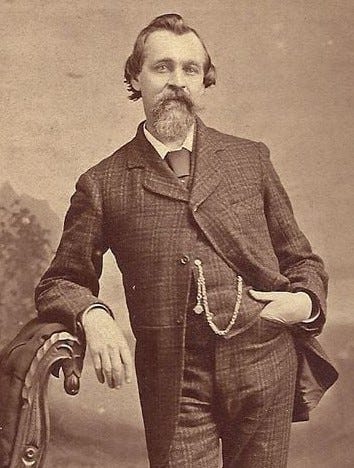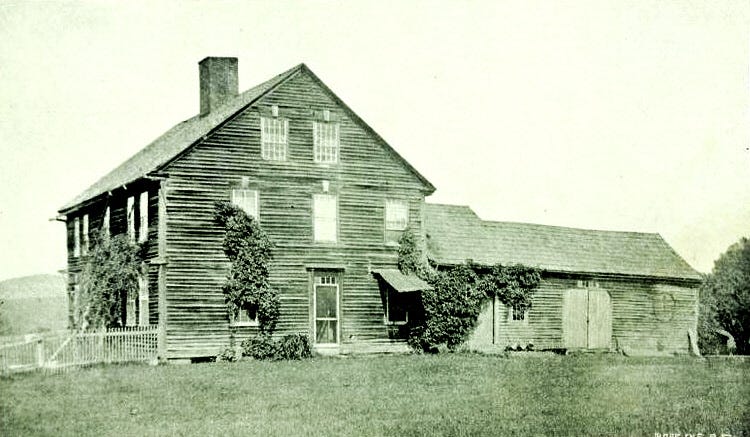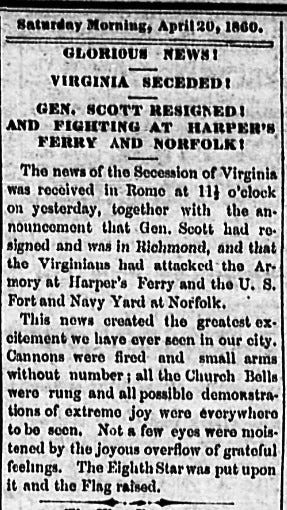The word Vermonter has certain connotations, rightly or wrongly calling to mind such qualities as independence, hard work, and a relatively enlightened attitude toward civil rights. The State Constitution banned slavery in 1777, emancipating men over the age of 21 and women over the age of 18. The state had a strong history of support for abolition, with its citizens playing an active role in the smuggling of enslaved people from the southern states along several Underground Railroad routes. Ultimately, however, people in Vermont were as imperfect as anywhere else. As Vermonters of the 19th Century left the state in search of better opportunities, some embraced the disparate values of their new surroundings, putting them at odds with their families and on the wrong side of history.
One of those who stood in marked contrast to the attitudes of his home state was Captain Melvin Dwinell. Born on 9 July 1825 in East Calais, Vermont, Dwinell was the fifth of ten children of Deacon Israel Edson and Phila (Gilman) Dwinell. Israel Dwinell was a farmer of above-average means, however, of their ten children, only Melvin and his older brother, Reverend Israel Edson Dwinell, Jr. (known as “Edson”) attended college, both at the University of Vermont. A biography of Reverend Edson Dwinell notes that he had to “buy his time” meaning to compensate his father for the lack of his services during the time he was at college.1 It is reasonable to assume that Melvin, as the younger brother, was similarly obligated. Melvin attended Washington County Grammar School in Montpelier, continuing his studies at the University of Vermont from which he graduated in 1849. He went on to serve as principal of People’s Academy in Morrisville, with his younger sister Jane in the role of assistant principal.
In 1853 Melvin Dwinell relocated to Rome, Georgia. Founded in 1834 on land taken from the Cherokees through the Indian Removal Act of 1830, Rome was a growing cotton and manufacturing hub on the Etowah River some 70 miles northwest of Atlanta. Several accounts state that Dwinell “went south” with four of his UVM classmates, seeking greater opportunities than could be found in the Green Mountain State. His classmates, however, settled in Louisiana and Virginia, suggesting that the relocation was not made en masse. A more likely probability is that Melvin was following in the footsteps of his brother Edson, who had taken a position as a schoolteacher in Jonesboro, Tennessee.
Perhaps concluding that teaching was not sufficiently remunerative, Melvin Dwinell bought a local newspaper, the Rome Courier, in 1855. It was at the time a weekly paper with some 700 subscribers, strongly nativist and pro-slavery in its editorial policies, and tied to the American, or Know-Nothing Party which was best known for its opposition to unrestricted immigration. By the 1860s he was publishing three editions a week. Dwinell’s political leanings were in marked contrast with those of his brother Edson, who had also abandoned teaching, in his case to attend Union Theological Seminary from which he graduated in 1848. Edson Dwinell would eventually become the Pastor of the South Congregational Church in Salem, Massachusetts.
Melvin Dwinell embraced Southern culture and values enthusiastically and completely, with the Courier frequently advertising the sale of enslaved people and joyously welcoming the looming hostilities.
The Courier’s pro-slavery views and aggressive rhetoric were well-known and decidedly unpopular in Vermont. On proposing in the 8 June 1861 issue of the Courier that “a friend” be allowed to raise an army of slaves and take the city of Washington and Abraham Lincoln prisoner, the Burlington Free Press countered with:
And who do you think owns and edits the paper which is so elated with the thought of having Washington taken and the President of the United States “trotted out” for “fun” by an army of slaves? Why it is a Vermonter – one who from infancy till grown up to man’s estate breathed the pure air and drank of the sweet water of the Green Mountains – who learned his school-boy lessons in Vermont free schools, and was taught philosophy and morals in our own Vermont University. But he “went South” to seek his fortune and became the editor of a southern newspaper, and now he shames the land of his birth, the mother who nursed him, and the teachers who taught him, by praising slavery, which he knows to be a curse, repeating slanders about the free north which he knows to be false, and advocating treason which he knows to be a crime.2
It is likely that Dwinell was a member of the local militia company, the Rome Light Guards, prior to the war, obtaining sufficient military experience to enlist and be elected a Second Lieutenant in May of 1861 when the unit joined the Confederate Army as Company A of the 8th Georgia Infantry. Commanded by Captain Edward J. Magruder, the Guards left Rome for Harper’s Ferry in early June, full of martial zeal.
When the Guards left Rome, Mrs. Magruder marched with her husband at the head of the column, appropriately rigged out for the occasion – pistol and dagger in her belt, and a stride full of belligerency.
The regiment received its baptism by fire at Manassas on 21 July 1861, suffering heavy casualties. While on active duty with the Confederate Army Dwinell communicated regularly with his newspaper, functioning as a sort of uncredentialed war correspondent. The 8th Georgia Infantry went on to serve through Williamsburg, the Seven Days Battles, Sharpsburg, and Fredericksburg. On 2 July 1863 then 1st Lieutenant Dwinell was wounded in the left arm while carrying the regimental flag at Gettysburg’s Wheatfield. The wound marked the end of his military service. On 16 November 1863, he resigned his commission to take a seat in the Georgia State Legislature.
Union forces captured Rome in May of 1864, seizing the office of the Courier and using it to publish their own newspaper, The Union Flag. General Sherman burned the city in November of that year. Unapologetic in his views, Dwinell nonetheless signed the Oath of Allegiance on 16 October 1867 and set about rebuilding his business. In 1876 he toured Europe and the Middle East, sending regular dispatches to the Courier which were later published in a book titled Common Sense Views of Foreign Lands.
Family ties seem to have transcended politics as Dwinell communicated with his family in East Calais throughout the war and made at least three visits to his childhood home in the years between 1867 and 1884. He continued to champion Southern interests.
Melvin Dwinell of Rome, Ga., spoke at some length of the soil, climate and healthfulness of northern Georgia and the advantages that section of the country offers to young men who wish to leave Vermont to find a better place for a home and business.”3
Dwinell sold the Courier in 1885 and died in Rome on 28 Dec 1887. A lifelong bachelor, he is buried with his parents in Fairview Cemetery, East Calais, Vermont.
What sort of man was he? His brother Edson’s biography makes little mention of him, noting only a journal entry on 19 September 1852:
Received this morning the joyful intelligence that Melvin is indulging the hope that he is a Christian. I have long felt anxious for him. He has had the advantages of an education and it seems sad to have an educated man irreligious.4
Irreligious he seems to have remained, and very much a study in contradictions. Raised within a relatively liberal environment, intelligent and well-educated, he was also reactionary and xenophobic. Perhaps he is best remembered not as an anomalous Vermonter but simply as an unapologetic defender of slavery and White supremacy.
Dwinell has been represented as the only Confederate soldier buried in Vermont, however, the website Vermont in the Civil War (https://vermontcivilwar.org/units/csa/) identifies at least 67 Vermonters who fought for the Confederacy, of whom three are reportedly to the buried in their home state. The others are Dr. James Bliss Davis, Surgeon of the Louisiana Brigade, buried in Danville, and Milo Walbridge Grow of the 51st Georgia Infantry, buried in St. Johnsbury.
Reverend Henry Erastus Jewett, Israel Edson Dwinell, D.D. – A Memoir with Sermons (Oakland, California: W. B. Hardy, Publisher, 1892) p. 12.
The Burlington Free Press, 1 May 1861 p. 3
Green-Mountain Freeman 13 August 1879 p. 2
Reverend Henry Erastus Jewett, p. 61.







Fascinating and well researched! I really enjoy these stories!